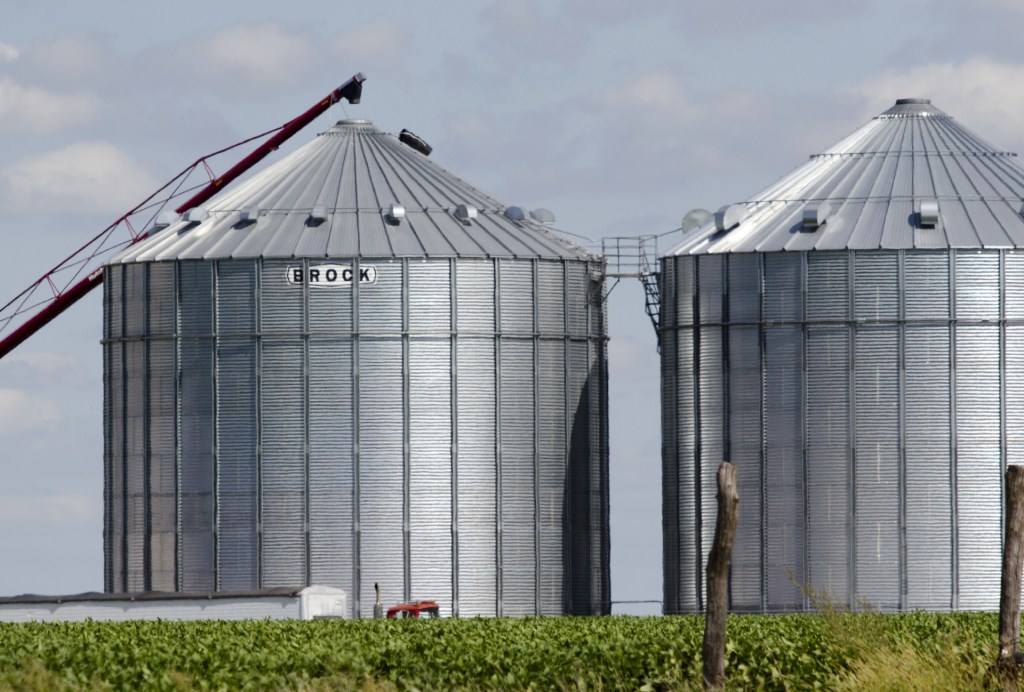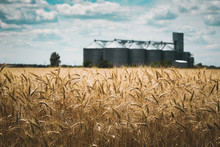Harvesting Surprise
Each autumn, as harvest-time nears, I re-live a surprise. Now, in early walks on crisp, chilled October mornings, I am reminded anew. I look to see if Jack Frost has spray-painted fresh abstract art on meadows. Recollections of other autumns come: hayrides, jack-o-lanterns, golden, maroon and salmon colored maple leaves gathered and pressed in the pages of an old encyclopedia. Or, I recall watching children “bob for apples” in an old wash tub or remember sweet, steaming cider served by a fireplace.

As I gaze to discover if hoarfrost has tinted a field in a crystalline hue, a rime-like shadow reaches across my consciousness. Perhaps the year was 2011; or thereabouts. A lovely autumn day and I am traveling across the nation’s farm-belt from of a distant meeting to my home, several hundred miles away. It promises to be a leisurely drive.
There being no urgency, I think of long-time friends. They work a large family farm. I will pass nearby. Hospitable folks, these. We exchange annual Christmas greetings. Every few years, some special event might bring us together. Each time — scribbled on a holiday card or spoken in a face-to-face visit — is the same gracious invitation: “Please, come visit; just drop by, anytime; no need to plan ahead.” I would nod, saying I would love to see their place; and, mean it. Still, years passed and the visit was never made. This would be a day I could stop. Surprise them.

This visit was the first of several unforeseen miscues that day! Readers familiar with the ebb and flow of agricultural life already know my error, my blunder. My surprise landed right in the middle of harvest. From sunup to sundown, and sometimes longer, combines whirled, rumbled and slashed. Farm trucks carried grain to the elevator cycling back and forth and back again unloading their bounty. This “surprise” visit was a first unforced error of the day.
When I greeted her on the phone, I should have picked up the overwhelm in her tentative voice. “Yes, so good to hear from you. Today? Well, yes, we would love to see you. The fellas will be gathering in the barn at noon. Can you make it by then? It is quicker if you take the county road over to our place. Come to the house first. You can help me carry over the lunch.”
Slow witted me! It was only as the call ended I realized I had bushwhacked them right in the middle of harvest! I was the city-slicker dropping by announced from the outskirts of hell.
I made it to the farm with a few minutes to spare and immediately offered my apologies. My friend only smiled and said, “It’s okay. You can help carry these things to the car.”
Arriving at the barn a half mile away, we pass the Pioneer Seed signs, the fuel pumps and grain storage elevator. Parking by an old John Deere we walk into a large structure with huge sliding doors at each end. It is full of implements: tractors, planters, harrows and several charts and computers along the western wall next to a small office. I am reminded that farming is an ever more sophisticated business.
We set out the lunch on a long table. Slowly others, family and farm hands, gathered. My friends introduce me as “a preacher friend who came by to pray for us today.” Okay, my turn to be surprised. So, I pray for a good harvest, for safety and well-being of all in our world during this harvest. I kept the prayer short knowing folks were eager to get back in the fields before rain might arrive.
Ample portions of chipped ham sandwiches, potato salad and iced tea are served. Some peanut butter cookies followed. There is teasing, talk about the weather, feeding the barn cats, and a few questions about mutual friends and grandchildren. Knowing the need to return to combines and trucks soon, I am amazed when my friend goes to his small office and returns handing me some papers. “Your going to enjoy this,” he chuckled.
It is a printout from an old dot matrix printer. Here before me were a collection of “jokes.” Reading the blue inked words, were some of the most offensive, racist jokes imaginable. They were about the President of the United States. Surprise hardly captures my emotions. It was closer to horror.
Still, I care for these people. My friend thought I would be amused, but this had burst across a divide in our worlds. I was confused, sad, disgusted, tongue-tied. I knew there was racial animus and bigotry toward Barack Obama, but surely not here. These were my friends, my good Christian friends.
I wish I could tell you of my courageous response, of my righteous witness. As I remember it now I didn’t say much, only mumbling “I don’t find this very funny.” A human hoarfrost was now stretching across our faces, our conversation, challenging the core of our friendship.
Soon, I was off, watching the dust of the combines in my rear view mirror. I was on my way home — back to another world, my natural habitat, an urban setting, on a university campus.
This surprising harvest occurred nearly a decade ago. Each autumn its memory returns and I realize it was a harbinger of much that has unfolded in our nation, especially in the last four years. Without any sense of irony, these are “good Christian folks,” at least in the way the see themselves and are seen by others. Even so they had burst open my easy assumptions.
They had reached out with hospitality to me — at least before I made my raid on their assumptions and routines. Racism is not the exclusive property of country folks. Many, many rural folks do not accept such bigotry; but many do. And yes, racism is alive and well in our cities and suburbs too. Still it seems to wait along the corridors of everyday activities to suddenly startle and divide us.
I have thought much about the culture that shapes these friends and their religious and political perspectives. Through study and conversations with many farmers, I know more of the stresses on those who today seek to make a living following a plow. I better understand the racial and cultural divides that can so easily be manpulated into fearful mistrust and misinformation.
I have learned that agriculture is changing dramatically, at an ever more rapid pace. Industrial-style agriculture is extraordinarily expensive and risky. Debt is high and weather is increasingly unpredictable. It is destined to change. It will ultimately be replaced by models more attune to sustaining the land, water and soils. Efforts to farm with perennial polycultures, like those being researched at The Land Institute in Salina, Kansas, will hopefully offer new options.
I am sad for my friends who carry the heavy load of racism and fear (and probably economic threat) that limits their ability to see the depths of racism that damage the soul of our nation. I pray they learn — in their church or social gatherings — of the ability to see others as persons of worth and dignity. I am saddened by the urban/rural and cosmopolitan/ localist divides in our nation and world.
I suspect my farm friends think me to be a “latte drinking urban elitist.” Even though, I don’t like latte! And, I am mindful of my own limited vision and fears that shape my understandings.
Richard Longworth’s fine book “Caught in the Middle: America’s Heartland in the Age of Globalism” offers compelling insights into the challenges of those who currently farm in America. He notes the phenomenon of vertical integration wherein every element of farm activity, from selecting seeds to spreading fertilizer to selling in a market is controlled by a large agribusiness — and not the farmer. As Longworth puts it, “Why own the farm when you can own the farmer?”
I don’t excuse the racism of my “friends.” Not at all. Nor do I miss the reality that a deep social/cultural divide was already emerging on the day I burst in on them. I fear such racism has only taken up greater residence in the minds of good people who now share their “jokes” on Instagram or Facebook rather than on a dot matrix printouts.
Something else was harvested on that October day a decade ago. My unacceptable silence was surfaced. It is the silence of too many of our churches, too many of our cultural and political leaders. What might I do better to express theology that valued all as Children of a loving God? How might I do better at harvesting respect, hope, love for the neighbor AND the stranger?
Perhaps I am overly optimistic, but it appears a harvest is underway in our society regarding racism. In the midst of the tragic deaths of folks like Breonna Taylor and George Floyd a new awareness seems to be possible. I suspect my farm friends don’t see anti-racism activities in the same hopeful light that I do. I see these as a sign of a potential harvest of hope — a sign that increasing racial justice might some day arrive… a time when the frozen assumptions and categories of our common life are thawed. It is not easy, not for my friends or for so many others caught up in the swirl of human distrust.
As I write a national election is only days away. I pray the current patterns of racism and ugly vitriol encouraged by the current national administration will be rejected and fresh sense of respect and the valuing of our common life can be harvested.
No matter the outcome, I will plan to make another visit to my farm friends — it has been too long since I saw them. Be assured I won’t bushwhack them again during harvest!


I, too, have had surprises like yours where I was too dumbfounded to have a reaction that could meet the requirements for threading the needle between friend & something foul said. The ”foul” revealed deeply held values very different from mine. Even a post hoc discussion can be a minefield. I’ve lost ”friends” in those discussions. I grieve the losses still.
LikeLike
I have been reading your blog since we first met. This is the best one you have done. It reveals the core of White racism…silence. When we have stopped being silent and speak out when we are confronted with racism will be able to say, “I am an anti-racist.” But to stop the silence has it’s consequences.
I want to strongly urge you to buy the book Deemed Unworthy by Robert Leroy Butler, MD. It’s only 80 reading pages long but every page is gripping. It’s on Amazon.
LikeLike
Thanks Bill — I have already checked on “Deemed Unworthy.” Looking forward.
LikeLike
Look forward to reading “Deemed Unworthy.” If you have the chance to look at “White Too Long” or “Caste” you will find excellent material in each. “White Too Long” is a great update (and improvement) on research I did back in the early 1970s.
LikeLike
I just saw this and I will look into both. I plan to have a zoom interview with Dr. Butler in the near future and will invite book buyers to the interview. I’m trying to get about 30 or so. Let me know if you want to be invited.
BTW, when you travel West you are always welcome here. This winter we are putting in a heated exercise pool, 12×25. You two would love it. Carol sends her love. My next book comes out in November.
LikeLike
Phil,
I share your shock and disbelief when becoming aware good Christians harbor racist inclinations. When I discover friends I have known and admired have prejudicial, homophobic, or political views contrary to my own, I am stunned, not because they have different opinions, but particularly when they ridicule, belittle, or in the political arena, overlook brazen transgressions. I tiptoe very carefully when these subjects are introduced knowing such friendships will be forever diminished.
LikeLike